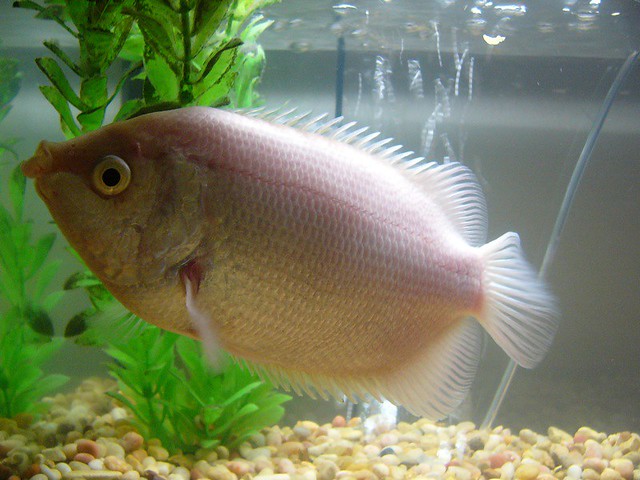(Original Title: The Kissing Gourami)
 |
| Photo by Catchpenny |
Scientific Name: Helostoma temminckii (green), Helostoma Rudolfi (pink)
Natural Location: Green variation originated from Thailand, pink variation from Java
Temperature: 72-82°F (22-28°C)
PH: 6.5-8.5pH
Size: 4-6 inches (10-15cm) They can grow up to 12 inches in the wild.
Diet: Omnivores, they enjoy vegetable matter and small invertebrates as well as readily accepting flakes
Swimming Level: Middle dweller
Breeding Type: Egg layers, eggs float and will adhere to floating plants
Ease of keeping: Beginner to intermediate
Tank Size: 30-gallon minimum
Profile: Kissing Gourami have the classic Gourami shape, narrow but the deep oval-shaped body, the dorsal and anal fin are equal in size and length. These fish are usually bought for their unusual 'kissing' action, this is not actually a sign of affection but rather a test of strength. Originally both the green and pink variations were considered the same species but have now been reclassified as two separate types.
The Kissing Gourami is one of the larger Gourami species so it does need adequate space. It is usually peaceful enough to be kept in a community tank with similar sized or larger fish but occasionally they can be territorial so care should be taken when choosing tank mates. They may also occasionally latch on to larger fish and damage the slime coat.
Males and females look identical and can't be distinguished until courting and spawning. Unlike most other Anabantoids they don't guard or care for their eggs or young. Eggs usually hatch within 24 hours of scattering and the resulting fry become free swimming in a further two days time.
Comments:
They enjoy eating algae and prefer a well-planted tank. Sturdy plants like Java fern are best as they can easily uproot or destroy sensitive plants as they graze.
I'm a breeder and importer of Show Quality Halfmoon Bettas as well as an avid keeper of a number of community tank fish. I am always happy to help with any general tropical fish or betta related questions, you can find me on my betta forum! Article Source: EzineArticles |

No comments:
Post a Comment